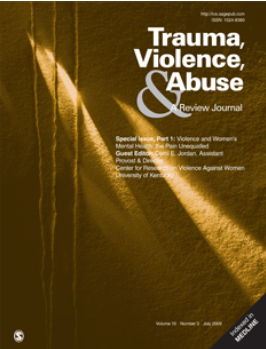Post-Traumatic Growth Promoting and Inhibiting Factors Among Intimate Partner Violence Survivors: A Systematic Review
IF 5.4
1区 社会学
Q1 CRIMINOLOGY & PENOLOGY
引用次数: 0
Abstract
Intimate partner violence (IPV) is a traumatic experience that is universally present across the globe. Undeniably, there are expected adverse outcomes. However, it is also conceivable that IPV survivors might see, feel, and experience a hopeful, positive future after their IPV experience. Notably experienced by IPV survivors is post-traumatic growth (PTG). PTG is a type of positive psychological change that occurs following the struggle with a traumatic experience. The changes are then reflected across five domains. As more studies on PTG among IPV survivors continue to rise, there must be a better understanding of the process. Following the Preferred Reporting Items for Systematic Reviews and Meta-Analyses protocol, this systematic review consolidated findings from existing literature guided by the research questions: (a) What areas of PTG do IPV survivors most experience positive psychological growth? (b) What factors are associated with PTG among IPV survivors? A total of 22 studies met the criteria and were included. Spiritual growth and new possibilities domains were experienced the most by adult IPV survivors. Contributing and inhibiting factors toward PTG were identified and categorized as interpersonal, contextual, or intrapersonal. Targeted interventions aiding the process toward PTG for IPV survivors were also identified, including commonly maladaptive coping strategies. This systematic review contributes to the literature by increasing knowledge that can be used for more effective support, interventions, and policies that promote PTG for adult IPV survivors.亲密伴侣暴力幸存者创伤后成长的促进因素和抑制因素:系统回顾
亲密伴侣暴力(IPV)是全球普遍存在的一种创伤性经历。不可否认,这种经历会产生预期的不良后果。然而,我们也可以想象,在经历过 IPV 之后,IPV 幸存者可能会看到、感受到并体验到充满希望和积极的未来。值得注意的是,IPV 幸存者会经历创伤后成长(PTG)。创伤后成长是一种积极的心理变化,是在与创伤经历抗争之后发生的。这种变化体现在五个方面。随着有关 IPV 幸存者创伤后成长的研究越来越多,我们必须更好地了解这一过程。本系统性综述遵循《系统性综述和元分析首选报告项目》(Preferred Reporting Items for Systematic Reviews and Meta-Analyses)协议,在以下研究问题的指导下整合了现有文献的研究结果:(a) IPV 幸存者在 PTG 的哪些方面最能体验到积极的心理成长?(b) IPV 幸存者的 PTG 与哪些因素有关?共有 22 项研究符合标准并被纳入其中。成年 IPV 幸存者经历最多的是精神成长和新的可能性领域。研究确定了促进和抑制 PTG 的因素,并将其分为人际因素、环境因素和人内因素。此外,还确定了帮助 IPV 幸存者实现 PTG 的目标干预措施,包括常见的适应不良应对策略。本系统性综述通过增加知识为文献做出了贡献,这些知识可用于提供更有效的支持、干预措施和政策,以促进成年 IPV 幸存者的 PTG。
本文章由计算机程序翻译,如有差异,请以英文原文为准。
求助全文
约1分钟内获得全文
求助全文
来源期刊

Trauma Violence & Abuse
Multiple-
CiteScore
13.60
自引率
7.80%
发文量
131
期刊介绍:
Trauma, Violence, & Abuse is devoted to organizing, synthesizing, and expanding knowledge on all force of trauma, abuse, and violence. This peer-reviewed journal is practitioner oriented and will publish only reviews of research, conceptual or theoretical articles, and law review articles. Trauma, Violence, & Abuse is dedicated to professionals and advanced students in clinical training who work with any form of trauma, abuse, and violence. It is intended to compile knowledge that clearly affects practice, policy, and research.
 求助内容:
求助内容: 应助结果提醒方式:
应助结果提醒方式:


